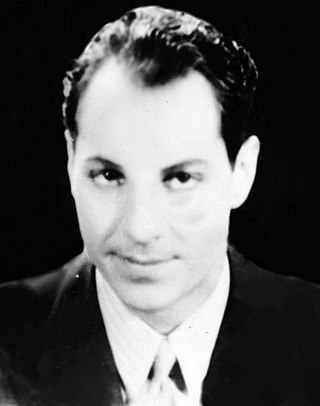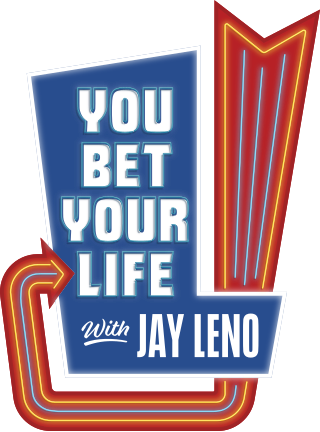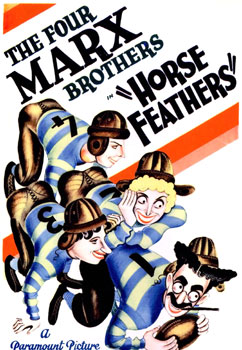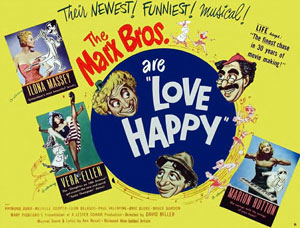
Julius Henry "Groucho" Marx was an American comedian, actor, writer, and singer who performed in films and vaudeville on television, radio, and the stage. He is considered one of America's greatest comedians.

The Marx Brothers were an American family comedy act that was successful in vaudeville, on Broadway, and in 14 motion pictures from 1905 to 1949. Five of the Marx Brothers' fourteen feature films were selected by the American Film Institute (AFI) as among the top 100 comedy films, with two of them, Duck Soup (1933) and A Night at the Opera (1935), in the top fifteen. They are widely considered by critics, scholars and fans to be among the greatest and most influential comedians of the 20th century. The brothers were included in AFI's 100 Years...100 Stars list of the 25 greatest male stars of Classical Hollywood cinema, the only performers to be included collectively.

Animal Crackers is a 1930 American pre-Code Marx Brothers comedy film directed by Victor Heerman. The film stars the Marx Brothers,, with Lillian Roth and Margaret Dumont, based on the Marxes’ Broadway musical of the same name. Mayhem and zaniness ensue during a weekend party in honor of famed African explorer Captain Jeffrey T. Spaulding. A critical and commercial success upon its initial release, Animal Crackers was shot at Paramount's Astoria Studios in Astoria, Queens, the second film the Brothers would make in New York City.

Duck Soup is a 1933 American pre-Code musical black comedy film written by Bert Kalmar and Harry Ruby and directed by Leo McCarey. Released by Paramount Pictures on November 17, 1933, it stars the four Marx Brothers and also features Margaret Dumont, Louis Calhern, Raquel Torres and Edgar Kennedy. Duck Soup was the last of the five Marx Brothers films released by Paramount Pictures. In the film, Groucho portrays the newly installed president of the fictional country of Freedonia. Zeppo is his secretary, while Chico and Harpo are spies for the neighboring country of Sylvania. Relations between Firefly and the Sylvanian ambassador (Calhern) deteriorate during the film, eventually leading the two countries to war.

A Night at the Opera is a 1935 American comedy film starring the Marx Brothers, and featuring Kitty Carlisle, Allan Jones, Margaret Dumont, Sig Ruman, and Walter Woolf King. It was the first of five films the Marx Brothers made under contract for Metro-Goldwyn-Mayer after their departure from Paramount Pictures, and the first after Zeppo left the act. The film was written by George S. Kaufman and Morrie Ryskind from a story by James Kevin McGuinness, with additional uncredited dialogue by Al Boasberg. The film was directed by Sam Wood.

Arthur "Harpo" Marx was an American comedian and harpist, and the second-oldest of the Marx Brothers. In contrast to the mainly verbal comedy of his brothers Groucho and Chico, Harpo's comic style was visual, being an example of vaudeville, clown and pantomime traditions. In all of his movie appearances, he wore a curly reddish blonde wig and did not speak, instead blowing a horn or whistling to communicate. Marx frequently employed props such as a horn cane constructed from a lead pipe, tape, and a bulbhorn.

Leonard Joseph "Chico" Marx was an American comedian, actor and pianist. He was the oldest brother in the Marx Brothers comedy troupe, alongside his brothers Arthur ("Harpo"), Julius ("Groucho"), Milton ("Gummo") and Herbert ("Zeppo"). His persona in the act was that of a charming, uneducated but crafty con artist, seemingly of rural Italian origin, who wore shabby clothes and sported a curly-haired wig and Tyrolean hat. On screen, Chico is often in alliance with Harpo, usually as partners in crime, and is also frequently seen trying to con or outfox Groucho. Leonard was the oldest of the Marx Brothers to live past early childhood, the first-born being Manfred Marx who had died in infancy. In addition to his work as a performer, he played an important role in the management and development of the act in its early years.

Herbert Manfred "Zeppo" Marx was an American comedic actor. He was the youngest, and last survivor, of the five Marx Brothers. He appeared in the first five Marx Brothers feature films from 1929 to 1933, and then left the act for careers as an engineer and theatrical agent.

Margaret Dumont was an American stage and film actress. She is best remembered as the comic foil to the Marx Brothers in seven of their films; Groucho Marx called her "practically the fifth Marx brother."

A Day at the Races is a 1937 American comedy film, and the seventh film starring the Marx Brothers, with Allan Jones, Maureen O'Sullivan and Margaret Dumont. Like their previous Metro-Goldwyn-Mayer feature A Night at the Opera, this film was a major hit.

You Bet Your Life is an American comedy quiz series that has aired on both radio and television. The original version was hosted by Groucho Marx of the Marx Brothers, with announcer and sidekick George Fenneman. The show debuted on ABC Radio on October 27, 1947, moved to CBS Radio debuting October 5, 1949, and went to NBC-TV and NBC Radio on October 4, 1950. Because of its simple format, it was possible to broadcast the show on both radio and television but not simultaneously. Many of the laughs on the television show were evoked by Groucho's facial reactions and other visual gimmicks. So the two versions were slightly different. The last episode in a radio format aired on June 10, 1960. The series continued on television for another year, recording the last season, beginning on September 22, 1960, with a new title, The Groucho Show.

Horse Feathers is a 1932 American pre-Code comedy film starring the Marx Brothers. It stars the Four Marx Brothers, Thelma Todd and David Landau. It was written by Bert Kalmar, Harry Ruby, S. J. Perelman, and Will B. Johnstone. Kalmar and Ruby also wrote the original songs for the film. Several of the film's gags were taken from the Marx Brothers' stage comedy from the 1900s, Fun in Hi Skule. The term horse feathers is U.S. slang for "nonsense, rubbish, balderdash," attributed originally to Billy DeBeck. As a work published in 1932 and renewed within 28 years, it will enter the public domain on January 1, 2028.

The Cocoanuts is a 1929 pre-Code musical comedy film starring the Marx Brothers. Produced for Paramount Pictures by Walter Wanger, who is not credited, the film also stars Mary Eaton, Oscar Shaw, Margaret Dumont and Kay Francis. The first sound film to credit more than one director, it was adapted to the screen by Morrie Ryskind from the George S. Kaufman Broadway musical play. Five of the film's tunes were composed by Irving Berlin, including "When My Dreams Come True", sung by Oscar Shaw and Mary Eaton.

Monkey Business is a 1931 American pre-Code comedy film. It is the third of the Marx Brothers' released movies, and the first with an original screenplay rather than an adaptation of one of their Broadway shows. The film also features Thelma Todd, Harry Woods and Ruth Hall and Rockliffe Fellowes. It is directed by Norman Z. McLeod with screenplay by S. J. Perelman and Will B. Johnstone.

Love Happy is a 1949 American musical comedy film released by United Artists, directed by David Miller and starring the Marx Brothers in their 13th and final feature film. The screenplay was written by Frank Tashlin and Mac Benoff, based on a story by Harpo.
Flywheel, Shyster, and Flywheel is a situation comedy radio show starring two of the Marx Brothers, Groucho and Chico, and written primarily by Nat Perrin and Arthur Sheekman. The series was originally broadcast in the United States on the National Broadcasting Company's Blue Network, beginning on November 28, 1932, and ending on May 22, 1933. Sponsored by the Standard Oil Companies of New Jersey, Pennsylvania and Louisiana and the Colonial Beacon Oil Company, it was the Monday night installment of the Five-Star Theater, an old-time radio variety series that offered a different program each weeknight. Episodes were broadcast live from NBC's WJZ station in New York City and later from a sound stage at RKO Pictures in Los Angeles, California, before returning to WJZ for the final episodes.

Morris "Morrie" Ryskind was an American dramatist, lyricist and writer of theatrical productions and movies who became a conservative political activist later in life.
Arthur Sheekman was an American theater and movie critic, columnist, playwright, and editor—but best known for his writing for the screen. His specialty was light comedy. Groucho Marx called him "The Fastest Wit in the West."

I'll Say She Is (1924) is a musical comedy revue written by brothers Will B. Johnstone and Tom Johnstone (music). It was the Broadway debut of the Marx Brothers. The initial production premiered in June 1923 at Walnut Street Theatre in Philadelphia, Pennsylvania before its national tour.

The Cocoanuts is a musical with music and lyrics by Irving Berlin and a book by George S. Kaufman, with additional text by Morrie Ryskind.


















